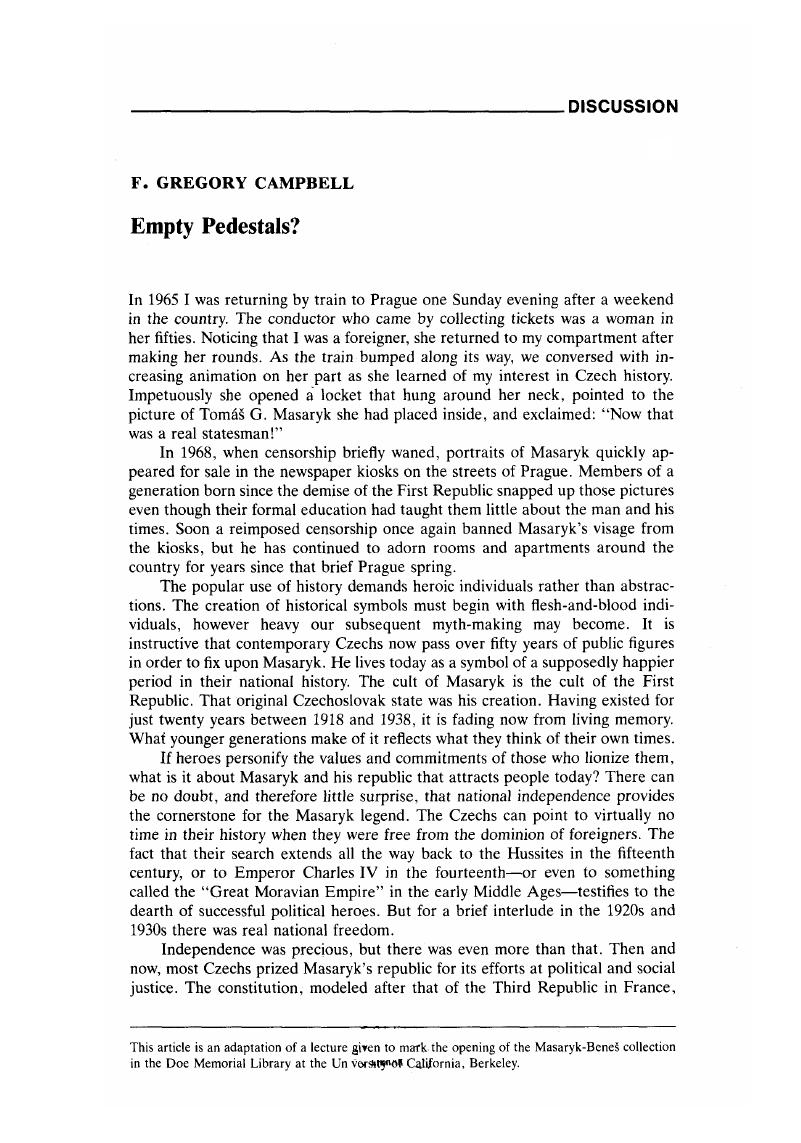Article contents
Empty Pedestals?
Published online by Cambridge University Press: 27 January 2017
Abstract

- Type
- Discussion
- Information
- Copyright
- Copyright © Association for Slavic, East European, and Eurasian Studies. 1985
References
The article is an adaptation of a lecture given to mark the opening of the Masaryk-Beneš collection in the Doe Memorial Library at the University of California, Berkeley.
1. Gordon Skilling, H., “The Rediscovery of Masaryk,” Cross Currents: A Yearbook of Central European Culture (1983), pp. 87–88.Google Scholar
2. Čapek, Milič and Hrubý, Karel, eds., T. G. Masaryk in Perspective: Comments and Criticism(n.p.: SVU Press, 1981)Google Scholar. Machovec, Milan, Pithart, Petr, and Dubský, Josef, eds., T. G. Masaryk a naše současnost, Masarykův Sbornlk VII (Prague, 1980)Google Scholar. The previously cited article by Skilling is a discussion of these two collections of essays. Skilling calls attention to salient arguments by a number of scholars, and I am heavily indebted to his article.
3. This statement was made in private conversations by colleagues in Czechoslovakia who have published studies based on the Foreign Ministry Archives.
4. See especially chapter 11 of Taborsky's, Edward President Edvard Beneš between East and West, 1938–1948 (Stanford, Calif.: Hoover Institution Press, 1981), pp. 245–54.Google Scholar
5. Erazim Kohák, “To Live in Truth: Reflections on the Moral Sense of Masaryk's Humanism, “T. G. Masaryk in Perspective, p. 38. Quoted by Skilling, “The Rediscovery of Masaryk,” p. 95.
6. Quoted by Skilling, “The Rediscovery of Masaryk,” p. 102.
7. There have been extensive debates about “what might have happened” had the Czechs resisted with physical force in 1938 or 1948. Taborsky summarizes them well in President Edvard Beneš. I agree with him that the arguments for resistance rest more on patriotic fervor than on a dispassionate analysis of military and political power relationships in those years.
8. Taborsky, President Edvard Beneš, p. 254.
9. The phrase is Taborsky's, ibid., pp. 253–54.
10. Neville Chamberlain used these words in his radio broadcast to the British people on the evening of September 27, 1938. They were reported in the London Times and have been quoted many times.
11. New York Times, August 22, 1968, p. 22. “Politicians Puzzled by Impact of the Czech Crisis. “
12. The pervasive pessimism in Berlin, encouraging an exaggeration of the dangers to the central Powers, is developed in the most cogent manner I have seen in chapter 3 of Hillgruber, Andreas, Germany and the Two World Wars (Cambridge, Mass.: Harvard University Press, 1981),pp. 22–40.Google Scholar
13. Szporluk, Roman, The Political Thought of Thomas G. Masaryk (Boulder, Colo.: East European Monographs, 1981), p. 37.Google Scholar
14. Masaryk's classical statement of his theory of Czech history came in Česká otázka ( “The Czech Question “), first published in 1895. Most of the book has been translated and published with other articles by Masaryk in Masaryk, Tomáš G., The Meaning of Czech History, ed. by Wellek, René, trans, by Kussi, Peter (Chapel Hill: The University of North Carolina Press, 1974)Google Scholar.
15. Szporluk, Political Thought of Masaryk, p. 81. Szporluk borrows the concept of a “secular'chosen people'” from Smith, Anthony D., Theories of Nationalism (New York: Duckworth, 1971)Google Scholar.
16. In 1932 Masaryk published an article under the pseudonym Č. P. (for Československý President)attacking Pekař's inaugural lecture as rector of Charles University. Masaryk saw in the lecturean attack on his own philosophy of Czech history. Masaryk's article has appeared under the title “On the Periodization of Czech History,” in T. G. Masaryk in Perspective, pp. 263–75.
17. “In shambles,” “shot through with holes,” “mythology “—these are some of the assessments made even by contemporary admirers of Masaryk concerning his philosophy of Czech history. Yet they also stress the importance of Masaryk's vision for the future of the national cause. One of the most respected critics finds among Czechs “a common ground, a common ethos, a yearning for freedom, for truth, for authenticity, which confirms the basic Tightness of Masaryk's idea of Czech history.” See Skilling, “The Rediscovery of Masaryk,” pp. 96–98. Masaryk, The Meaning of Czech History, intro. by Rene Wellek, p. xxiii.
18. Gregory Campbell, E, Confrontation in Central Europe (Chicago: The University of Chicago Press, 1975), pp. 28–37.Google Scholar
19. Zeman, Zbyněk, The Masaryks: The Making of Czechoslovakia (New York: Harper and Row, 1976), pp. 111–12.Google Scholar
20. Quoted by Skilling, “The Rediscovery of Masaryk,” p. 100. See also Patočka, Jan, Dvěstudie o Masarykovi (Toronto: Sixty-Eight Publishers, 1980)Google Scholar.
21. I have argued this at greater length in “Central Europe's Bastion of Democracy,” East European Quarterly, 11 (Summer 1977): 155–76.
22. The words are those of McNeill, William H. in his introduction to Andriĉ's, Ivo The Bridge on the Drina (Chicago: The University of Chicago Press, 1977), p. 2 Google Scholar. Chapter 19 of the novel contains a marvelous depiction of youthful messianic nationalism on the eve of World War I.
23. Rothschild, Joseph, East Central Europe between the Two World Wars (Seattle: University of Washington Press, 1974), pp. 134–35.Google Scholar
24. Political parlance in interwar Prague referred to that group of ultimately influential decision makers around Masaryk and Beneš as the “Castle.” The term was derived from the presidential residence in Hradčany. For efforts to define the meaning of the “Castle,” see Bosl, Karl, ed., Die “Burg “: Einflussreiche politische Kräfte um Masaryk und Beneš, 2 vols. (Munich: R. Oldenbourg,1973–74)Google Scholar. For a recent view of Czechoslovak politics from the opposition, see Pithart, Petr, “Prvni republika: jak ji vidě1a opozice,” Svědectvi, nos. 70/71 (1983): 271–314 Google Scholar.
25. Teichova, Alice, An Economic Background to Munich: International Business and Czechoslovakia,1918–1938 (Cambridge: Cambridge University Press, 1974). pp. 377–82.Google Scholar
26. H. Gordon Skilling, “Independent Historiography in Czechoslovakia,” Canadian Slavonic Papers, 25 (December 1983): 526–27.
27. The scholar who wote the article on Bolzano was Radim Palouš, who had been a lecturer in pedagogy at Charles University. Skilling, “Independent Historiography in Czechoslovakia, “pp. 526–27.
- 1
- Cited by


